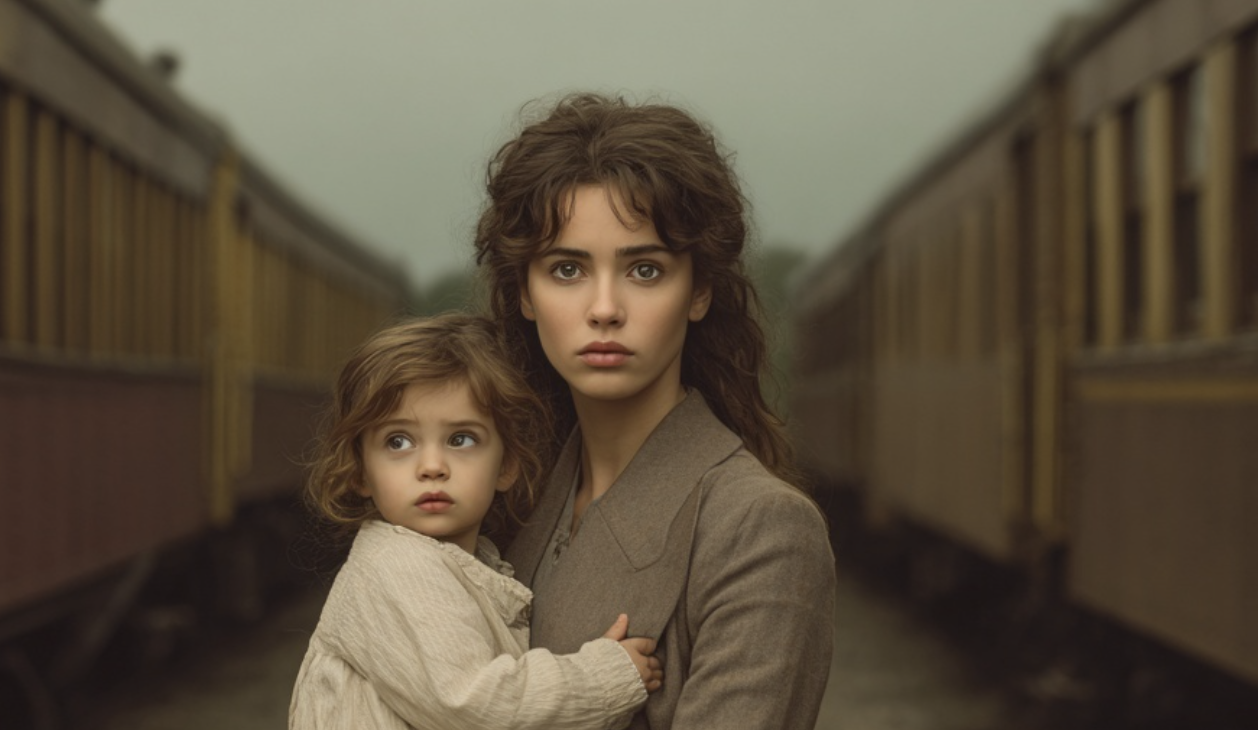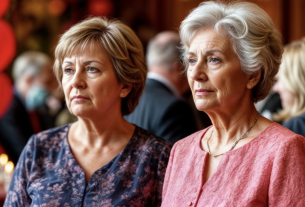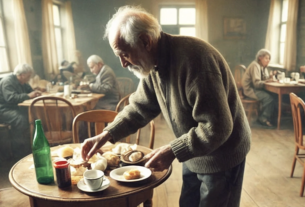“Just take her and run, you understand? Right now…”
“But why me? What makes me so special?”
Thirty years have passed, yet those words still echo in my mind as if whispered only yesterday. That evening forever altered the course of my life. And now, looking back through the prism of time, I see it clearly—nothing in our lives happens by accident. Everything is connected.
It was the winter of 1995, one of the bleakest I can remember. A miserable mix of wet snow and freezing rain turned every walk into torment. The wind lashed sharp ice crystals into my face, making my eyes water. I stood shivering at a bus stop, dreaming only of home: of sinking into my favorite armchair with a steaming cup of tea after yet another exhausting day.
Work at the store had been brutal—an unscheduled delivery, a tedious inventory count, and customers with endless complaints. My legs throbbed, my thoughts blurred into a storm of numbers and voices.
“Marina, waiting for the last bus again?” came the familiar rasp of my neighbor, Zinaida Petrovna.
“What else can I do?” I smiled wearily. “I can’t afford a taxi.”
“And Lyosha? When’s he finally buying that car? He promised…”
“We’re saving little by little…”
I turned away, embarrassed by my own shy grin. Everyone around us already knew of our plans: sometimes we were saving for a car, sometimes for a renovation, sometimes for a long-dreamed-of trip. And always, somewhere beneath it all, for the child we so desperately wanted. But the years slipped past, mercilessly.
That was when I noticed her—a woman in a worn coat, clutching a child. She moved nervously, like a wounded bird, searching every face. When her eyes met mine, I felt an ache of raw despair hit me straight in the chest.
“Please, just hold her a moment,” she blurted, thrusting the little girl toward me. “I’ll be quick… just to the newsstand.”
Before I could react, I found myself holding the child. She was astonishingly light, calm, and silent. A battered suitcase stood at my feet.
“Wait—!” I began, but the woman was already swallowed by the rushing crowd.
Minutes ticked by. Five. Ten. I remained rooted to the spot, clutching a stranger’s child, torn between disbelief and fear.
“You’ve lost your mind!” Lyosha stormed around the kitchen like a caged animal. “We have to call the police right now!”
On the couch, the little girl slept peacefully, wrapped in an old blanket. The suitcase sat untouched—I was even afraid to open it.
“Let’s at least see what’s inside,” I whispered.
Inside were neatly stacked bundles of money, bound with bank ribbons. Documents too: a birth certificate for Anna Sergeyevna Volkova, age two years and two months. And then—the note.
Reading it stole my breath away.
“Lyosha,” I murmured, “do you remember what we always dreamed of…”
“Don’t say it! This… this is…”
“A crime?” My fingers trembled over the paper. “And abandoning your own child—what would you call that?”
He collapsed into a chair, covering his face.
“We have good jobs, a decent apartment…”
“But in some quiet village, no one would ask questions.”
“What village?”
“Any village, as long as it’s far away. We could sell the apartment…”
The next morning, little Anna opened her eyes and looked at us with such calm trust it was as if she already knew—this was meant to be.
Lyosha hovered at the kitchen doorway, his expression slowly softening. My husband was kind at heart, though sometimes he needed time to arrive at the right decision.
“Would you like pancakes?” he asked gently, stepping closer. “I can make them shaped like bunnies.”
Her eyes lit up instantly.
“With the longest ears!” he grinned, winking at me. “You know, I’ve got a friend in Tver. Says the nature there’s amazing. Houses are affordable too…”
I hugged Ani tighter. She nestled against me, already trusting me with her whole little heart. Sometimes fate hands you a gift you never expected—and all that’s needed is the courage to accept it.
The village of Sosnovka met us with suspicious eyes and sagging fences. Our house was too big, too drafty, but perfect for a new beginning.
“They’re from the city,” the local women gossiped on their benches. “And they brought a child. Whose girl could she be?”
“Obviously theirs. She looks like her mother.”
“No, she’s the father’s spitting image!”
I passed with a smile. Let them wonder—it was our secret blessing. And strangely enough, Ani really did resemble us both, as if fate itself had decided to lend a hand.
That first winter was brutal. Lyosha worked long days in the forestry service, I learned the ancient art of stove heating, and Ani—curious, fearless Ani—turned every icicle and snowdrift into an adventure.
“Mommy, why does snow crunch?”
“Because it’s very cold, my love.”
“And why is it cold?”
“Because it’s winter outside.”
“And why winter?”
“Because…” I hesitated, gazing into those serious, searching child’s eyes. “You know what? Let’s ask Daddy when he comes back. He’s our real forestry expert now!”
And indeed, Lyosha had become just that—completely devoted to his new calling. Every evening he would tell us, with unflagging passion, about animal tracks in the snow, about birds and their hidden habits, about how trees whispered to each other through their roots. Ani listened in rapture, hanging on every word. And I, watching them together, thought quietly to myself: this is happiness.
“Marinichka!” Our neighbor Klavdia suddenly burst through the yard gate, breathless. “An accident! Your Anya—she jumped from the shed roof!”
My heart stopped cold. I ran, stumbling over my galoshes. And there she was—Ani, sitting on the ground, gripping her scraped knee in both hands. Amazingly, not a tear in sight.
“I wanted to be a bird,” she murmured, embarrassed. “But it didn’t work.”
“Oh my darling…” I wrapped her tightly in my arms.
“Alive!” she squeaked at last—and only then burst into sobs.
By evening, a fever set in. All through the night, Lyosha and I kept vigil, swapping out cold compresses, measuring her temperature again and again. A doctor’s call was far too costly, and we had no money left after the move. We had promised ourselves never to touch the money from that mysterious suitcase.
Then, like fate itself, old Baba Nyura appeared on our doorstep—her arms full of dried raspberries and herbs.
“I have a cure for everything,” she said firmly. “Come, let’s brew some tea.”
She stayed with us until dawn—teaching us herbal rubs, telling stories of her children and grandchildren, filling the night with warmth.
Time passed like the quiet stream near our village—so calm on the surface, yet always changing its course. Ani went to school and quickly stood out as a bright, curious student. Teachers adored her, especially her biology teacher.
“She will be a doctor,” declared Tatiana Nikolaevna. “She has an attentive mind—and such gentle hands.”
I only nodded, hiding tears of pride. But then came the difficult questions about why we had so few relatives, why there were no early photos. We told a tale about a bitter family feud over our move.
“They thought us strange,” I explained with a smile. “Maybe we were. But it was the happiest kind of madness.”
At twelve, Ani pressed harder.
“Mom, why no baby photos? What about when I was little?”
“They were lost during the move,” I said, pretending to fuss with dough.
“And where was I born? Which hospital?”
“In Moscow,” I replied. It was true—at least on her certificate.
She frowned, but let it go. Though more and more, she spent hours in the attic among old boxes, as if searching for something unspoken.
At sixteen, she fell for the local troublemaker, Vitya Prokhorov. Lyosha fumed, threatening to drive him off.
“Don’t you dare,” I stopped him. “The forbidden fruit is sweetest. Let her learn.”
And she did. Within a month, Vitya was visiting often—helping with chores, strumming the guitar, reciting Yesenin. Who could have guessed?
“Mom,” Ani said one evening, “I’ll go into medicine. But not in Moscow.”
“Why not?”
“Because I want to stay close. To you and Dad.”
I hugged her tighter. At times, it seemed she knew. That some quiet sixth sense told her we weren’t bound by blood. But her warm embrace whispered louder than any truth—she loved us. That was all that mattered.
We broke our vow about the suitcase money only once. Ani was finishing school when fire tore through the Kuznetsov family’s home.
“Let’s help them!” Ani demanded, fists clenched.
“How do you know?” I gasped.
“I found out long ago,” she admitted. “I thought you were saving it for something important.”
Lyosha and I exchanged glances. Somehow, we had raised not just a kind soul, but a wise one.
So we gave, anonymously. And Ani entered medical school, exactly as she’d dreamed. She studied, worked, interned—refusing our help.
“You’ve already given me the most important gift,” she told us. “The rest I’ll manage myself.”
Years slipped by. Our house aged, yet grew cozier. Lyosha’s hair turned silver, though he stayed the same—steady and kind. I mastered Baba Nyura’s pies and herbs. And Ani… Ani became the doctor she was destined to be. Stern when needed, gentle when possible, always listening to others’ pain.
“You know, Marina,” Lyosha said one evening, gazing at the sunset, “that woman at the bus stop… she didn’t come to you by chance.”
“What do you mean?”
“She chose you. Maybe it was your eyes, maybe your heart—I can’t say. But she made the right choice.”
I fell silent. That woman in her shabby coat often returned in my dreams. Did she ever wonder how her daughter’s life unfolded? Did she regret her decision? Or did she realize the priceless gift she had given us?
They say money doesn’t buy happiness. Perhaps that’s true. Because the greatest treasure wasn’t hidden in the old suitcase in the attic, but in Ani’s laughter, in our family dinners, in those endless heartfelt talks. In that simple word—“Mom”—spoken in the tender voice of a beloved daughter.
Thirty years slipped by like a single breath. Now, watching the autumn leaves scatter outside my window, I feel that this season is different. Maybe because Ani is coming. Or maybe because it’s finally time.
That suitcase had lain in the attic all these years, gathering dust and cobwebs. Sometimes I would brush my hand over its cracked leather, but I never opened it. The moment wasn’t right. Until now.
“Mom, Dad!” Ani’s cheerful voice echoed across the yard. “Get ready—the guests are here!”
She stepped out of the car—graceful, radiant, still wearing her white doctor’s coat (Lyosha never tired of teasing her about her habit of treating it like a second skin). Behind her came her husband, Mikhail, with their children—ten-year-old Pasha and seven-year-old Masha.
“Grandma!” the grandchildren cried, racing toward me.
Lyosha hurried to meet them, limping slightly after last year’s accident in the forest, but smiling with pure happiness. And suddenly the house was alive again—with laughter, with chatter, with the thundering steps of children. The evening unfolded in our old way: steaming tea, homemade pies, news from the city, Pasha proudly showing his latest Lego masterpiece, and Masha spinning across the floor in a dance.
“Just imagine,” Ani said, laughing, “today a frightened little girl with a fever was brought to me. And do you know what? She reminded me of myself. Remember, Mom, when I decided to jump off the shed roof?”
“How could I forget?” I smiled, exchanging a meaningful glance with Lyosha. He nodded almost imperceptibly—it was time.
“Ani,” I said, rising from the table, “come help me bring something important down from the attic.”
The suitcase felt heavier than I remembered. Maybe not from its contents, but from the years sealed inside it. Years of silence, waiting for this moment. Long ago, when you stumbled upon it by accident, you only saw the money inside—and thought it was our secret savings. Tonight, at last, you would hear the truth.
Misha and the children had already left for the hotel—he always seemed to sense when to give us space.
“What’s this?” Ani asked, touching the worn leather. “Your old things?”
“No, my love,” I whispered, placing the suitcase gently before her. “They’re yours.”
I unfasten the locks, their rusty creak sounding as if they resist the unveiling of a secret long buried. At the very top rests a yellowed envelope, inside it—a note. Beneath lie neatly bundled stacks of money.
“I don’t understand,” Ani whispers, her hands trembling as she takes the paper.
“Thirty years ago,” I begin, my voice quivering, “at a bus stop in Moscow…”
The story pours out of me—about that fateful winter night, about the decision to leave the city, about the fear of discovery, about sleepless nights and moments of pure happiness. About a love that began in an instant and never faltered. About the constant fear of losing it all.
Ani stays silent, fingers nervously crumpling the note, her eyes widening with every word.
“So… I’m not really your biological daughter?” she finally murmurs.
“You’re the dearest thing in my life, no matter what.”
“But why keep it from me all these years?”
“At first, we were terrified they’d take you away,” I admit softly. “Later, we feared the truth would wound you. And then… we simply lost the courage. You were happy, and we couldn’t bring ourselves to change that.”
“And the money?” she asks, glancing at the suitcase’s contents. “Why didn’t you use it?”
“They were always meant for you,” I shrug. “We decided one day we’d tell you everything and let you choose their fate. Well… we did spend a little—remember how we helped the Kuznetsov family?”
A heavy silence follows, almost alive. Outside, dusk deepens. The streetlamps flicker on, a dog barks in the distance, and a neighbor’s cat cries plaintively. An ordinary evening in Sosnovka—but for us, it feels extraordinary.
“You know,” Ani says, brushing away her tears, “I think I always sensed it. I couldn’t explain why, but something felt… unusual. Too sudden, too strange, the way we ended up here.”
“And you never said anything?” Lyosha, now back in the room, asks in disbelief.
“Why would I?” she smiles through tears. “I was happy. You loved me, cared for me, raised me. What difference does it make how I came into your life?”
She walks toward the window. In the glow of the lamplight, her silhouette seems almost otherworldly.
“I wonder what she was like… my real mother.”
“She loved you,” I say firmly. “Otherwise, she would never have entrusted you to those who could give you everything she couldn’t.”
Ani turns to us, eyes bright with something unexpected. “You know what’s strange? I don’t feel angry. Not at her—for leaving. Not at you—for hiding the truth. Everyone just… did what they had to do.”
The next morning, we gather on the porch. The sun rises slowly above the forest, painting the pine tops with a tender pink glow. It’s our day off, and soon Misha will arrive with the children.
“I’ve been thinking,” Ani says, stirring her tea, “about the money.”
Lyosha and I exchange glances.
“There’s a children’s home in the neighboring district,” she continues. “They’re shutting it down—no funds for repairs, no proper equipment. There are kids there just like I once was. Maybe…”
“Are you sure?” Lyosha asks carefully. “It’s a lot of money.”
“Daddy,” she smiles warmly, “you always told me money should work. What could be more meaningful than giving someone else a chance at a family?”
I look at my daughter and think—how lucky we are. Not because of what lies in that suitcase. No. But because of her. Because of that one moment, that one choice at a bus stop that changed everything.
“Mommy,” Ani suddenly hugs me like she used to as a child, “shall we make pancakes? Remember how Daddy always shaped them like bunnies?”
“With big ears!” Lyosha laughs. “I’ll show Pasha and Masha now—we’ll keep the tradition alive.”
I nod, hiding my tears of joy. They say real kinship isn’t written in blood, but in love. And perhaps it’s true. That love—like those bunny pancakes—slightly clumsy, a little imperfect, yet the truest, warmest, and forever ours.



